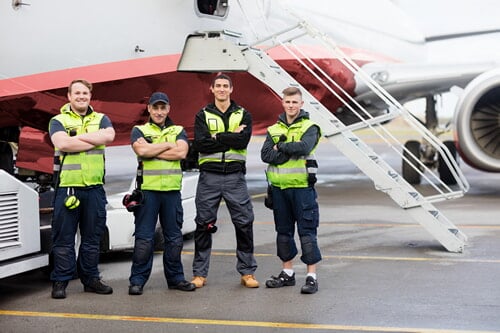Personal Protective Equipment

Airline Industry Overview and Airport Safety Hazards
While it doesn’t seem like an airline job might be dangerous, many of the jobs do pose hazards that could cause severe or even catastrophic injuries. Whether you are a mechanic, work on the ground service crew or are a baggage handler, there are many ways you could sustain injuries. Abolox carries personal protective equipment (PPE) that can significantly reduce the risk of injury.
The United States has 5,211 public airports and 14,850 private airports that provide services to people and airline companies, including aircraft maintenance, baggage handling, aircraft testing, repair services, and engineering solutions.
The largest airports are:
- Denver International Airport in Colorado.
- Dallas / Fort Worth International Airport in Texas.
- Orlando International Airport in Florida.
- Washington (Dulles) International Airport in DC.
- George Bush Intercontinental Airport in Texas.
- Salt Lake City International Airport in Utah.
- O’Hare International Airport in Illinois.
- San Francisco International Airport in California.
- John F. Kennedy Airport in New York.
- Detroit Metropolitan Airport in Michigan.
Occupations and Personal Protective Equipment for the Airline Industry
Depending on the airline occupation, workers could sustain severe or catastrophic injuries at work. Wearing the appropriate personal protective equipment significantly reduces the risk of injuries. Occupations include:
- Service technicians and aircraft mechanics examine components on the planes, maintain landing gear, and ensure the planes are ready to travel. These workers need hard hats, safety glasses, hearing protection, protective gloves, safety shoes, and life jackets.
- Material, freight and stock movers move bulky items through airports. They work on loading docks with plenty of hazards, including working in extreme weather and working with chemicals, animals, machinery and plants. They should have the same type of PPE that service technicians use, though the protective gloves should be impact-resistant gloves.
- General maintenance and repair workers inspect airport machinery, such as conveyors and baggage carts, to ensure it is working properly. They often come in contact with oil, tools, motors, corrosive substances, belts, and moving parts. They should have impact-resistant gloves and chemical protection gloves on hand, depending on what they are doing, in addition to the same personal protective equipment that a service technician uses.
- Equipment and vehicle cleaners work with scrubbing and scraping machines, disinfectants, cleaners, abrasives, insecticides, polishes, and dyes. They should have chemical protection gloves, abrasive-resistant gloves, and waterproof clothing in addition to the same personal protective equipment that a service technician uses.
- Airline security guards come into contact with hazardous materials, biological contaminants from human and animal waste and fluids, and also face hazards from firearms and other weapons.
- Transportation security screeners come into contact with passengers before they board and could encounter many materials and devices. Wearing safety glasses, shoes and gloves, and hearing protection help protect them from the many hazards they may encounter.
Some of the common hazards workers might encounter while working at airports include:
- Baggage handling: Heavy lifting, machines with moving parts and dangerous substances.
- Snow removal crews work in extreme temperatures and are often in low-visibility situations. They work with icy and rough surfaces and machinery with moving parts. They also come into contact with chemicals and de-icing products. Wearing hi-vis clothing helps keep them safe, as does other PPE, including goggles, ear protection, protective gloves and safety shoes.
- Bloodborne pathogens are always a concern at airports, thanks to the sheer number of people and animals that go through the airports. Hazards include saliva, waste, blood and airborne particulate matter.
- Cuts and abrasions. Abolox carries cut-resistant gloves, abrasion-resistant gloves and puncture-resistant gloves.
- Chemicals and hazmat spills.
- Moving vehicles.
- Extreme temperatures – both hot and cold.
Even if workers believe they won’t be exposed to many of these hazards, they should still have personal protective equipment on hand – one never knows what his or her job will bring on any day. While cleaning, a worker could run across drug residue, bodily fluids, and more. Equipment that seems to run without any problems and that is properly maintained can still fail.
Visit Abolox for Personal Protective Equipment for Occupations in the Airline Industry
Abolox carries personal protective equipment for all jobs in the airline industry. All of our PPE is top-quality and meets industry standards. You can purchase personal protective equipment for yourself or in bulk if you supply it for your employees. If you don’t see what you need on our site, call the office, and we’ll source what you need. Visit Abolox for PPE today.